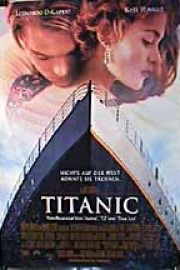Titanic
The past 12 years have not been kind to “Titanic.” Between the Celine Dion song about hearts going on (and on…and on) to Cameron declaring himself “King of the World” on the Oscar stage to, well, just about everything about it, “Titanic” hasn’t had it so good since it took the long cruise to 11 Oscars (which tied it with “Ben Hur” and later, “The Lord of the Rings: The Return of the King”) and $600 million at the box-office, the highest total ever.
Indeed, every anachronistic bit of dialogue still hurts the ears (especially when it comes out of Leo’s mouth), but the film still thrills in a way that only James Cameron can provide. And let’s face it, after the months of bad buzz about issues on set, the (at the time) expensive $200 million price tag, the director of the first two “Terminators,” “The Abyss,” “Aliens,” and “True Lies” did have the last laugh. And he’s preparing to do the same this week with another massive undertaking in “Avatar.”
But back to “Titanic.” Let’s talk about Kate Winslet (always a favorite topic for me). She finally won her Oscar for “The Reader,” but her Rose DeWitt is still one of her most memorable characters, and she’s a typical Cameron heroine. Tough but sensual. Head-strong but still capable of being hurt. And let’s face it, she’s the reason guys didn’t mind getting dragged by their girlfriends to see this movie. Her sly jab at Titanic’s builder with her comment about Freud. Her taste in art. “I’d rather be his whore than your wife.” Her determination to find Jack (Leonardo DiCaprio) when he’s been falsely accused by her insufferable fiancee Cal (Billy Zane in full silent villain mode).
And then there’s her nude scene. Cameron is a sly bastard for how he sets it up. Forget their later car scene together (although I do love the sweat coming off of Kate’s, um, landscapes)- this is the real sex scene in the movie. In the name of an artist drawing the woman he loves, Cameron uses the picture Jack draws as the MacGuffin that moves the plot along, as Rose wears the “Heart of the Ocean” diamond as she poses for Jack. It’s this picture that, when found by a modern treasure hunter (Bill Paxton), puts the story in motion. (It also helps that he’s set up Rose as a woman whose appreciation for art and inner free spirit would make her open to posing nude.)
More than that, though, the scene also has one of the best examples of James Horner’s considerable contributions to the film. A lot of the score’s sound feels derived from his earlier, superior work from “Braveheart,” but in this scene, it’s just Horner at the piano, with that beautiful love theme playing as Jack tries to hide his, um, excitement as Rose keeps her revealing pose for his (actually Cameron’s) exacting hand. It’s unquestionably the best scene in the movie for Cameron as a director of intimate personal moments.
Pretty much everything after the iceberg hits is Cameron in full-bore action mode. More than at any other time in the film, Cameron makes us feel where all that money went. And his abilities as an action director carry the film’s through its’ roughest waters- I mean, we already know Rose lives, and of course, the ship sinks. But his shrewdness knows no bounds. You see, he’s already shown us what to expect with a modern computer recreation, so once it hits, we know exactly what’s gonna happen.
That doesn’t make the last hour any less thrilling. Horner’s music is a brilliant companion to the action. We see tragedy and honor hand-in-hand with the way historical figures of the event handle the ship’s sinking (and getting as many passengers off as possible) as our heroes fend for their lives in the face of near-certain death both at the hands of the frigid Atlantic and Cal’s sinister man-servant Snedley, er, Lovejoy. Cameron’s command of his craft is extraordinary- it’s a dramatic tour de force that makes us care for all on board, from ship designer Andrews (Victor Garber) to the Captain (Bernard Hill) to Jack’s ethnic pals in Steerage.
I haven’t really mentioned DiCaprio. He’s as good as the material allows him to be. He captures Jack’s Bohemian, “Road Less Traveled” attitude towards life beautifully (especially during his upper-class dinner with Cal, Rose, and the Unsinkable Molly Brown (scene-stealer Kathy Bates), among others). But good God his dialogue is wretched. Cameron’s script is tin-eared when it comes to how to capture what he wants in Jack’s character. He’s much better at traditional action heroes and villains than romantic souls. DiCaprio took the heat for the performance (and was denied an Oscar nod as a result), but for my money, he made up for it later with sterling turns for Scorsese (“The Aviator,” “The Departed”) and Spielberg (“Catch Me if You Can”).
Would the film still win Best Picture today? Who knows. It would depend on the competition. I still feel like it didn’t deserve it then (especially against Curtis Hanson’s near-flawless “L.A. Confidential”), but the film is still a white-knuckle action drama with a strong “Romeo & Juliet”-esque love story in the middle. That makes it a great entertainment, even if it doesn’t really hold up under close scrutiny as “our generation’s ‘Gone With the Wind,'” which is was called twelve years ago. Peter Jackson finished that six years ago with his “Lord of the Rings” trilogy. That’s not stopping Cameron from trying again to be “King of the World” as a filmmaker and artist.
We’ll find out Friday if history repeats itself (although I’m holding out until Monday to see “Avatar” in IMAX with some friends).










